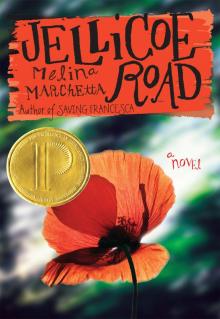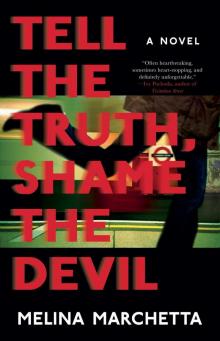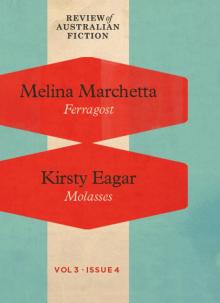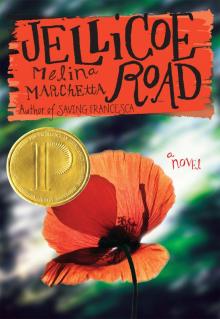- Home
- Melina Marchetta
The Place on Dalhousie
The Place on Dalhousie Read online
About the Book
An unforgettable story about losing love and finding love; about the interconnectedness of lives and the true nature of belonging, from one of our most acclaimed writers.
‘This is wonderful storytelling – full of humour, tenderness and honesty.’
Debra Oswald, creator of Offspring and author of Useful and The Whole Bright Year
‘I can’t remember when I’ve loved a book so much. It really touched my heart.’
Amanda Keller
When Rosie Gennaro first meets Jimmy Hailler, she has walked away from life in Sydney, leaving behind the place on Dalhousie that her father, Seb, painstakingly rebuilt for his family but never saw completed. Two years later, Rosie returns to the house and living there is Martha, whom he married less than a year after the death of Rosie’s mother. Martha is struggling to fulfil Seb’s dream, while Rosie is coming to terms with new responsibilities. And so begins a stand-off between two women who refuse to move out of the home they both lay claim to.
As the battle lines are drawn, Jimmy Hailler re-enters Rosie’s life. Having always watched other families from the perimeters, he’s now grappling, heartbreakingly, with forming one of his own …
Contents
Cover
About the Book
Title Page
Dedication
Part One: When Rosie met Jim
Chapter One
Part Two: The house that Seb built
Chapter Two
Chapter Three
Chapter Four
Chapter Five
Chapter Six
Chapter Seven
Chapter Eight
Chapter Nine
Chapter Ten
Chapter Eleven
Chapter Twelve
Chapter Thirteen
Chapter Fourteen
Chapter Fifteen
Chapter Sixteen
Chapter Seventeen
Part Three: Going home
Chapter Eighteen
Chapter Nineteen
Chapter Twenty
Acknowledgements
About Melina Marchetta and Room to Read
About the Author
Praise
Also by Melina Marchetta
Imprint
Read more at Penguin Books Australia
For Brenda
Because I love being a supermodel with you.
It’s rained for forty days and forty nights, so when a guy who looks like Jesus in orange SES overalls comes to stand next to her, Rosie thinks it’s all a bit biblical.
Up on the meat-raffle stage, the pot-bellied chief of emergency services is trying to get a word in. He’s just mentioned the words ‘forced evacuation’ and the whole place is in an uproar. Some old bloke yells out that the Dawson threatens to flood every year and it’s nothing to get their knickers in a twist about. The mayor is pushing for evacuation.
‘Kev and his people aren’t putting their lives at risk for you stubborn mongrels,’ he’s shouting over everyone. ‘Move out of the low-lying areas now or you’ll be cut off for at least a week.’
Rosie feels SES Jesus’s stare and she makes eye contact. He’s a bit older than her, but not that much. Mid-twenties, maybe. Or younger, but he seems like he’s been around.
‘Jim,’ he says.
Crazy eyes. A lunatic. Always the lunatics.
‘Rosie.’
‘For Rosemary?’
‘Rosanna.’
There’s a whole lot of shoving around them. On any given night The Royal gets half a dozen patrons, mostly old-timers. But tonight it’s packed, and no one wants to leave because Maeve from the newsagency’s brought along sandwiches and sausage rolls.
SES Jesus’s stare is intense. ‘You’re pretty.’
Rosie wants to hear something more original than that, but she lets him buy her a beer. What else is there to do but hear stories about the last big flood, of ’74, from some of the old blokes who haven’t spoken about anything interesting since?
And that’s all it takes. A couple of drinks and she’s back in some strange guy’s room, upstairs at the pub. His calloused fingers find their way between her legs and she realises that she’s going to spend another night of her life screwing a guy she doesn’t know. Makes her feel as if she can’t climb out of the bat cave, and the bleakness is smothering.
‘You’re going to have to stop doing that,’ she hears him say, and Rosie realises that she’s crying. He mutters something, but she doesn’t catch what it is.
Prickteaser? Bitch? Luke had an arsenal when it came to name-calling.
The guy on top of her – Jim, she remembers – falls back beside her. She can hear his ragged breathing. Wonders how much time she’ll let pass before she climbs out of his bed. The walls are paper-thin and she can hear the muffled sounds of two people having it off next door. She makes her move.
‘Stay,’ he says. It’s with a sigh. One of empathy, and she hasn’t felt anything close to that for a long time. She turns to face him in the dark, feels the tickle of his beard every time he takes a breath.
The lovers next door are at it. Rosie already knows their names because Stace needs to articulate in the third person everything she wants Roger to do to her.
‘Go to sleep,’ Jim murmurs.
‘While that’s going on?’
‘It’ll be over in less than a minute. Tops. I’ve listened to this four nights in a row. Roger takes about ten seconds to come.’
A moment later there’s silence from next door.
‘Told ya.’
Rosie chuckles and he laughs. A warm sound.
He’s gone when she wakes in the morning and she’s relieved they don’t have to do the polite stuff. Outside, it’s drizzling and steamy and her tee-shirt’s pasted onto her with the grime that comes from humidity and sweat. A couple of utes and four-wheel drives pass by, packed with possessions being taken to higher ground. Rosie wonders if she’s left it too late to get out of this town. Wishes Luke was here. Realises she hasn’t missed him at all, but he would have been someone to make a decision with. She’s been in this town for five weeks now. According to the Tidy Towns sign out on the highway, there are 970 people living here: all whingers, in her eyes. Those she’s met, anyway. Rosie hasn’t made a friend the whole time so she has no idea what to do when a flood is on the forecast except for what she heard last night from SES Jesus.
At the cenotaph one of the RSL guys is removing the wreaths, probably as a precaution. She’s never been into the whole Anzac thing so it surprises her that she’s memorised the twenty-six men who have died in wars since 1914. The names that stick out the most are the O’Hallorans. They make up eighteen of the dead and she wonders how many of them are left. She’s the last Gennaro of her family and the second last on her mother’s side. When Rosie and her Nonna Eugenia die, there’ll be none of them left. So much for big Italian families.
She crosses the low-lying bridge that takes her over the river and out to the old Simpson Road that backs onto the gully. There are half a dozen properties out here. It’s where she’s been living since Luke did a runner last week. When they first arrived in town, she found a job looking after someone who’d just had a hip replacement. Rosie hasn’t got any qualifications, but she does the housework, feeds the chooks, cooks and buys the old woman beer. There’s no love lost between her and Joy Fricker, but Luke’s departing gift was also nicking off with the money she had saved, so if Rosie wants to get out of this town sometime soon she doesn’t have much choice.
On the Fricker property she can feel the dampness on the grass. It’s too much water to have come from the morning drizzle, so she wonders if it’s already an overflow from the river. The house is
an old two-storey Queenslander on stumps about seventy centimetres above the ground, so Rosie’s hoping it’ll keep them dry.
‘Still in the same clothes from yesterday.’
The ironically named Joy is sitting on the verandah. She wears eighty years of bitterness in a lower lip that hangs down in a constant bag of sourness.
Rosie ignores her and walks into the kitchen to fix breakfast. She whistles for Bruno, but there’s no bark of acknowledgement.
‘Where’s my dog?’ she calls out.
Miss Fricker’s followed her inside.
‘Made a nuisance of himself so I had to tie him up, didn’t I?’
Rosie bristles, but holds her tongue. Wants to tell the old woman that if she’s strong enough to tie up a kelpie border-collie cross then she can clean up after herself.
They eat in silence before she goes to run Miss Fricker’s bath, but nothing comes out. Last night, the head of emergency services was worried the lines would go underwater so she figures they’ve cut the power. Most properties have a generator that kicks in, but no one’s looked in on Miss Fricker since Rosie arrived, so she can’t imagine a flood plan’s in place.
She spends the morning with SES Jesus’s instructions in her head, because he was a talker and didn’t shut up the whole night. Removes anything she can off the floor in the living room and kitchen. The cane armchairs, the rug, baskets and vases. The furniture she’s able to lift, she piles onto the table. In the kitchen, she grabs some of the china that looks sentimental and packs it away in a box with the photos on the mantelpiece before taking it all upstairs into the spare bedroom. Miss Fricker watches the whole time, her eyes suspicious. Once or twice Rosie hears Bruno barking and peers outside, but it’s not until early afternoon that she’s alarmed to see water almost up to the chicken coop, about ten metres from the back steps of the house.
‘We need to get to the evacuation centre in town,’ she tells Miss Fricker.
‘I’m not going anywhere.’
‘We can’t stay here, Joy. We could be cut off for days.’
‘This is just a way of getting me out of my house and sticking me in that nursing home!’
It’s all Rosie’s heard for weeks, because Joy Fricker’s nephews are pricks, dying to get their hands on the property to sell. The problem for the Fricker boys is that their aunt still has her wits and isn’t going to sign anything over to them. But Rosie doesn’t give a shit about the Fricker family problems and she’s not staying if the banks of the Dawson have broken. Once she’s retrieved Bruno, she’s out of here.
Outside, in knee-deep water, she heads to the yard where Miss Fricker’s gone and tied Bruno a couple of metres away from the goat. She’s thrown by how fast the water’s risen. SES Jesus had warned her that when it came, it was full-on. He had seen it down south when he was living in Lismore. He was a city boy, amazed by how everything could change in less than five minutes. It takes Rosie more than one attempt to undo the goat and the moment he’s free, he nicks off. Rosie wades over to where Bruno is barking. The water suddenly hurls her forward, slamming her into the fence, winding her. It’s only Bruno’s whine that has her struggling to her feet to clutch the post and edge towards him, the splinters digging deep into her palm until she feels the wet fur of his coat against her arm. She’s frightened to untie him for fear of him being swept away, but can’t bear the idea of keeping him tethered in case he goes under and drowns in front of her. Because if he does, Rosie knows she’ll let go. Fears she’s been wanting to let go for so long now.
Studying the flow around her, she takes a chance. Carefully unties Bruno and wraps the leash around her wrist, but goes under twice and feels herself being swept away. It’s only the Hills hoist that she latches herself onto that stops them. She’s colder than she’s ever been in her life but she doesn’t move because the water has a rage beyond anything she’s seen, and it wants to snatch them both, wants to fling them against a tree trunk or the side of the house. There’s a vengeance to its force and she can’t fight it because she’s bone-tired. Wants to close her eyes, except Bruno is growling beside her and she knows they have to find their way back up those steps. But as cold and frightened as she is, Rosie feels safe staying put. Because in the backyard of the house in Dalhousie Street, her best memories were of the Hills hoist. Of her mother singing Rosie songs in dialect. Rosie knew them all and she sings them quietly in Bruno’s ear until it’s her mother’s voice she can hear. Clearer than she has for years.
She doesn’t know how long they stay. Doesn’t know how she finds the strength to let go again, but somehow they make it inside. The entire downstairs is flooded and for an awful moment she thinks Joy Fricker has been swept away. Until she sees the old woman sitting waist-deep in water on the stairs, her teeth chattering.
‘Upstairs,’ Rosie manages to say. Miss Fricker shakes her head and Rosie figures that she’s tried to get up those stairs and failed. For once, she feels sorry for her. There’s a vulnerability that Rosie hasn’t seen before, even after the hip replacement when she couldn’t wipe her bum without help.
‘We can’t stay down here, Joy. Let’s go.’
Rosie’s no bigger than Miss Fricker and she buckles under her weight as she helps her step by step, Bruno at their heels shoving them forward. She’s worried that she’ll snap Miss Fricker’s arm, but better a broken arm than being found facedown in rancid water.
In the musty-smelling room that Joy Fricker hasn’t used since her operation, Rosie removes the old woman’s wet clothing and dresses her. In her own room, she strips off and finds a pair of shorts and a tee-shirt, anything that won’t drag her down if she ends up back in the water. The deluge becomes a phantom in her head, and she imagines it creeping its way up, engulfing them, so she drags a chair onto the landing and keeps watch at the top of the stairs. Has no idea what she’ll do if that water slinks towards them, but needs to know what she’s up against.
Later, in the dark, she feels a shudder of the house, picks up the torch and goes to the window, trying to get a glimpse of whatever’s coming downstream to hammer them.
‘My father built this house for me.’
Rosie jumps at the sound of her voice, shines the light towards Miss Fricker, who’s standing at her bedroom door.
‘It’s got good foundations.’
Rosie helps the old woman back into bed and then curls up in the tacky velvet armchair close by. On the wall, the Sacred Heart of Mary clock taunts her, moving at the excruciating speed that punishes those who are praying for time to pass.
‘If my father knew what his grandsons were trying to do, it would have broken his heart,’ Miss Fricker says. For her, there still seems to be a greater malevolence than a flood.
Despite the darkness, Rosie can feel the old woman’s bitter scrutiny.
‘You look the type to break your father’s heart.’
‘Yeah, but he broke mine first.’
A voice wakes them. Bruno is barking at the bedroom door and Rosie untangles herself from the chair, blinded by daylight that snuck up on her while she wasn’t looking. She wipes saliva from her mouth and heads to the landing.
‘Looters,’ Miss Fricker whispers from her bed, because everyone is the enemy in her eyes. Rosie puts a finger to her lips and creeps down a step for a look. SES Jesus is standing thigh-deep in water, wearing only his budgie smugglers and orange SES jacket. Not quite an apparition, but Rosie feels a hysterical laugh bubble up inside her at the sight of him.
‘Told you to get to higher ground,’ he says.
‘Have you got a boat?’
He shakes his head. ‘The CFA have lent us their truck. Outboard motors are too dangerous. Who knows what’s under this water.’
Rosie helps Miss Fricker out of bed and can feel the old woman trembling. On the mantelpiece, she sees a Mary MacKillop brooch and pins it onto Miss Fricker’s dress before walking her to the door. The old woman refuses to take another step at the sight of him coming up the stairs.
�
��Now they’re hiring perverts,’ she mutters.
‘You’re going to have to put your arms around my neck,’ Jim tells Miss Fricker, ‘and I’m going to have one arm around your back and the other under your knees.’
And there’s something about the way skinny SES Jesus hitches Miss Fricker up in his arms and wades through the deluge that makes Rosie think that she’d follow him anywhere.
It’s the town butcher who drives the CFA truck through the flood-water. He loses control of the wheel more than once, yelling Christ at the top of his lungs. Rosie feels the perspiration running down her brow, undoes her seatbelt, readying herself for the inevitable. They’ll go under, for sure, trapped in a tomb of water. As if sensing her fear, Jim turns in the front seat, catches her eye.
‘Almost there, mate.’
They pass the cenotaph and Rosie sees shops half submerged, garbage bins bobbing in filthy brown water and an elderly couple sitting on the roof of their car being towed by a ute. The butcher, Mick, she thinks, swears at a couple of kids watching it all, sitting on the awning above the fish and chips shop, laughing their heads off, oblivious to the fear. And it’s only SES Jesus’s calm instructions to Mick, suggesting another route down less dangerous roads, that brings Rosie any comfort.
The evacuation centre is in the cottage owned by the Country Women’s Association, perched high on a hill. Standing at the entrance Rosie sees a familiar face, one she’s locked horns with before. A couple of weeks back she had to pick up medication for Miss Fricker at the hospital pharmacy and was put through the third degree by this woman, a local midwife who had come in to deliver a baby. This morning she looks at Rosie with just as much hostility.

 Froi of the Exiles
Froi of the Exiles Finnikin of the Rock
Finnikin of the Rock On the Jellicoe Road
On the Jellicoe Road The Piper's Son
The Piper's Son The Place on Dalhousie
The Place on Dalhousie Quintana of Charyn
Quintana of Charyn The Lumatere Chronicles: The Complete Trilogy
The Lumatere Chronicles: The Complete Trilogy What Zola Did on Tuesday
What Zola Did on Tuesday Tell the Truth, Shame the Devil
Tell the Truth, Shame the Devil Looking for Alibrandi
Looking for Alibrandi What Zola Did on Monday
What Zola Did on Monday Froi of the Exiles lc-2
Froi of the Exiles lc-2 Review of Australian Fiction, Volume 3, Issue 4
Review of Australian Fiction, Volume 3, Issue 4 Jellicoe Road
Jellicoe Road Froi of the Exiles: The Lumatere Chronicles
Froi of the Exiles: The Lumatere Chronicles Quintana of Charyn lc-3
Quintana of Charyn lc-3 Finnikin of the Rock lc-1
Finnikin of the Rock lc-1 The Lumatere Chronicles
The Lumatere Chronicles